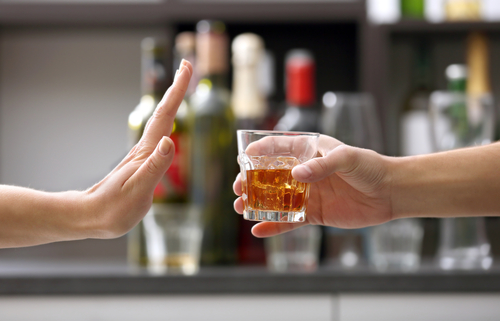It is possible to prevent alcohol relapse, if the individual stays diligent and takes proactive measures to do so. It is important for the individual to remember that they can’t avoid all temptations and triggers. This is why recovery must follow steps that will help the individual make the right decision when faced with a potential trigger.
Causes of Alcohol Relapse
Alcohol relapse is common among individuals in recovery. Common triggers of relapse among recovering alcoholics include:
- Exposure to small amounts of alcohol
Just a small exposure can trigger a full-blown relapse when an individual is in recovery. This could be through food cooked with alcohol, unknowingly, or if the individual tests themselves to see if they can drink ‘just a little’.
- Environmental triggers
These types of triggers include those people, places, or activities the individual once associated with drinking. This category of triggers also includes social pressure to drink. Because environmental triggers are so far-reaching, they are extremely difficult to avoid. Successful recovery and relapse prevention includes the training and tools to help the individual make healthy decisions when faced with these triggers.
- Stress
Many individuals who have a problem with alcohol use it as a way to combat stressful feelings. When a stressful event occurs, the individual may feel the urge to return to old patterns and begin drinking again. Living a completely stress-free life is impossible, so it’s essential to find ways to cope with stress without returning to alcohol abuse.
Stave Off Alcohol Relapse
There are a number of ways for an individual to stave off alcohol relapse.
- 12 Step Programs
The most well known 12 step program is Alcoholics Anonymous, which aims to provide help for individuals struggling with an alcohol addiction through a structured program that gives support and encouragement during recovery. AA members discuss their own struggles with alcohol during meetings. By listening to others speak about their own recovery journeys, the individual can learn tips on how to deal with possible triggers and avoid relapse. AA also encourages members to follow or work with their 12-step program. These 12 steps are a list of suggested ideas and actions to help individuals in recovery mend their lives and stay sober.
- Therapy
Through therapy, either as an individual or in a group setting, the individual can learn how to respond to stress and environmental triggers.Therapy is a proactive step to help the individual understand how to deal with a high-risk situation when they encounter one. Individuals in recovery who successfully handle high-risk situations and triggers feel increasingly self-sufficient, and these positive feelings can reduce the chance of a relapse.
- Medication
In some cases, medication can be prescribed to help an individual in recovery prevent a relapse. Medications like Disulfiram are used to train the mind and body to recognize the harmful effects of alcohol, as well as break the positive association the individual may have with alcohol.
LEAD Recovery Center knows that a full, independent life in recovery is possible. Our treatment programs are designed to create total autonomy and help clients evolve into leaders of their own lives and those around them. For more information, call us today at 1-800-380-0012.


